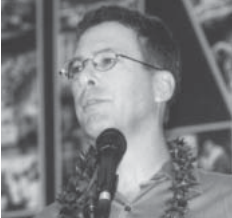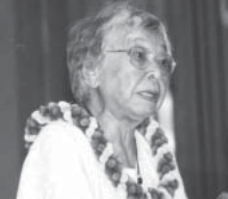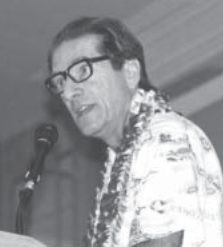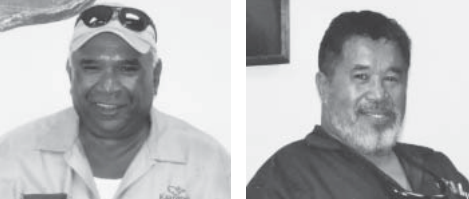
The ILWU joined thousands of workers from various Hawaii unions on October 23 in a demonstration to protest President Bush’s union busting and anti-working family policies. The demonstration, also attended by progressive organizations and community members, was held at the main entrance of the Hilton Hawaiian Village Hotel in Waikiki where Bush was scheduled to attend a Republican Party fundraiser. The President avoided the demonstration by slipping into the hotel through a side entrance.
More local convention highlights

ILWU International Attorney Robert Remar
Robert Remar has been a partner in the law firm of Leonard Carder, LLP of San Francisco since 1989. The law firm has stood firmly on the side of workers and had provided legal represention to the labor movement for over 60 years.
The firm’s founders, Norman Leonard and William Carder have represented the International Longshore & Warehouse Union since the 1940s, defended Harry Bridges and other accused Communists in the 1950s, and countless other labor unions over the years.
More recently, Remar and the Leonard Carder firm represented the ILWU during the West Coast longshore negotiations of 2002, in numerous organizing drives, and in some unusual cases where union leaders were sued by employers for demonstrating in support of Liverpool workers and in another case where nine longshore members were injured when Oakland police fired on a peaceful anti-war protest in April 2003.
Remar is now advising the ILWU on numerous legal issues dealing with port security and the so-called Patriot
—continued on page 2

Retired ILWU Social Worker Ah Quon McElrath
Ah Quon McElrath first became involved with the ILWU when she worked in a soup kitchen during the 1946 Sugar Strike. She went on to become the ILWU’s first full-time social worker, where she helped to build the union’s membership services program. She was responsible for providing social service, contractual benefit and family health education to ILWU workers.
Ah Quon embodies the values, the conscience, and the very soul of the
—continued on page 3

Harry Bridges Scholar/Actor Ian Ruskin
Ian Ruskin acted the part of former ILWU President Harry Bridges, as if Bridges had come back to life and was addressing the ILWU Local 142 Convention and commenting on the important issues of today. Ruskin, acting as Bridges, had a lot to say about the Bush Administration’s war on Iraq and the attack on civil liberties.
Ruskin graduated from the Royal Academy of Dramatic Art in London and has worked extensively in theater, television and film.
Ruskin is the founder and current director of The Harry Bridges Project, an organization dedicated to promoting the legacy of Harry Bridges. Bridges (1901-1990) was one of the “founding fathers” of the ILWU, giving leadership to the union from 1933 until his retirement as ILWU president in 1977. Bridges passed away on March 30, 1990.
Considered one of America’s greatest labor leaders, Bridges helped create a union based on rank-and-file democracy, racial equality, solidarity with workers throughout the world, and a belief that unions and its members should be actively involved in social and political issues.
—continued on page 6
Amfac Kaanapali workers keep jobs, get severance
KAANAPALI, Maui—Sixty workers of the Kaanapali Golf Course will receive almost one million dollars in severance and vacation pay from former owner Amfac-JMB, as required by the ILWU union contract. According to Amfac management, the workers deserve every penny.
The golf course is now owned by the Hawaii Employees’ Retirement System, which took possession of the property after Amfac’s Pioneer Mill defaulted on a $40 million loan. The golf course was collateral for the loan. Most of the workers continued their employment with the new company, Kaanapali Golf Management, under the same terms and conditions as before.

John Kuia (left) started working at the Kaanapali Golf in 1960, right after high school. No one knew what a golf course was in those days. John is now an electrical foreman. Harry Keahi (right) was 15 years old when he started working at the golf course in 1960. His first job was clearing kiawe bushes and picking up rocks for $1.35 an hour. He now operates heavy equipment.
